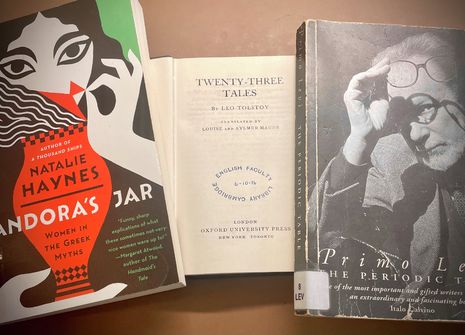Varsity’s exam season reading list
From Tolstoy to Primo Levi, Varsity‘s Arts team provides some remedial texts for exam season

‘Two Cures for Love’ by Wendy Cope – Emily Cushion (Arts Editor)
Mocking. Disobedient. Brief.
I don’t know about you, but the amount of words I have forced myself to stare at, scrutinise, pull apart, and memorise over the past few weeks of revising has put me off them altogether (maybe). Some people think poems can be just a few words long, but this toes the line of laziness for me. Two lines, I would say, is the absolute minimum length a poem should be. Yes, we all know that one two-line Pound poem, but if you want something a bit more modern and a bit less modernist, try out Wendy Cope’s ‘Two Cures for Love’. The poem effectively breaks all of the rules that poetry has curated for itself over history – but does so in a delightful, humorous way. Cope pours an awful lot into those two lines – I should know this, because I once spent an entire hour discussing them in a supervision (yes, this works out to just over 3 minutes per word). Such a short poem results in an inevitable ambiguity that left me thinking about this poem for much longer than the few seconds it takes to read it. Plus, it’s easy to memorise, unlike the content of my exams.
Twenty Three Tales by Leo Tolstoy – Niall Quinn (Arts Editor)
Frank. Parabolic. Sober.
As revision content slowly but surely pervades the mind, the thirst for knowledge that brought us here is significantly diminished. The short story – and Twenty Three Tales in particular – is a remedy for this. Imparting pithy wisdom, humour, and accounts of various aspects of nineteenth century Russian life, these stories will allow you to learn. One does not really learn during exam season, but rather becomes a kind of human washing machine – a jumbled mess of information from the past two terms is merely re-packaged on the answer sheet. The delightfully plain-yet-elegant prose in which these tales are told ensures that their moralistic messages stick – from Ivan the Fool’s honesty and kindness to Pahom’s poisonous lust for land. Indeed, last year, I often found myself posing the question “What would Ivan do?” when faced with moral dilemmas. Read Twenty Three Tales, and you might just end up revising yourself this term, in addition to your revision material.
The Periodic Table by Primo Levi – Abril Duarte-Gonzalez (Arts Writer)
Expansive. Grounding. Poignant.
Concise enough to fit into your busy Easter revision schedule, The Periodic Table sees Levi turn properties and behaviours of the elements into a parallel for his own life. Unlike his other works, which often embody the cruelty and shame of humanity, this short collection is more poignant and acute, recounting his pursuit of knowledge, work, family, and survival. In fact, when I first read it last exam season, I gulped it down in a couple of sittings, but because it’s structured in 21 short essays—each based on a different element of the periodic table—it could be just as good to dip in and out of. In times where studying can sometimes feel overwhelming and abstract, Levi’s attention to detail is grounding. His luminous, clear prose weaves a connection between science, literature, and history. The collection manages to encompass much of 20th-century Western European history: the rise of fascism, the nightmare of the concentration camps, his post-war efforts to survive and rebuild, while also offering us philosophical musings, scientific explanations, and teenage confessions. In many ways, it appreciates the power of storytelling for making sense of our lives.
Orbital by Samantha Harvey – Bryony Clarke (Arts Writer)
Thoughtful. Comforting. Vast.
This short, Booker Prize winner came recommended to me by a close friend who loved Harvey’s style, and it did not disappoint. Set inside a space shuttle and spanning just 24 hours, it is divided into bite-size chapters, each representing one of the ISS’s 90-minute orbits around the Earth. Watching our planet’s swirling surface through a window, the astronauts grapple with grief, boredom and homesickness while the novel considers questions great and small about the human experience. At once scientific and spiritual, Orbital offers wonderful reflections on life from a unique perspective, reframing the familiar in poetic but never preachy prose. The slim volume could easily be consumed in an afternoon, but dipping into any of its standalone ‘orbits’ for a pensive quarter of an hour would equally provide a welcome – and grounding – study break. When exams loom so large they seem to have their own gravity, perhaps being reminded of our place in the universe is just the reality check we need.
New and Selected Poems by Mary Oliver – Rachel Jones (Arts Writer)
Quiet. Green. Secret.
We’ve all been in the position of being stuck at a desk revising, looking out longingly at a beautiful summer’s day. Mary Oliver’s poems are just what to read when you need to remember how it feels to sit barefoot in grass or swim in a river on an exam-free day. The predominant feeling of her poems is wonder: her gaze is captivated by the things in deep green shade, that bow or sway in the wind, or with wings, beaks, shy hooves. With her verse she builds a shrine to these things; her veneration transforms them into prompts for musings on the way we live in the world and exactly how it feels to be alive. A hummingbird realises that “most of the world / is waiting / or remembering- / most of the world is time / when we’re not here.” But Oliver doesn’t just provide existential reassurance (even if exam term has you looking for this). Primarily, her poems are a feast for the senses, the perfect antidote to an over-stimulated brain. They are for “those white flowers / […] sticky and untidy, / in the warm fields’; for ’cramming the black honey of summer / into my mouth.”
Beach Read by Emily Henry – Elsie Hayward (Arts Writer)
Romantic. Addictive. Diverting.
I promise I’m a real English student and also a serious-minded appreciator of contemporary literature, but this is a recommendation for exam term. Last year, as soon as I made it to May Week, I reached for Beach Read. If you have the energy and motivation to read something of real literary merit during exams, I commend you, but personally I need to relax and read something soothing that delivers exactly what I’m expecting. Emily Henry is the answer if you’re a secret enjoyer of just-trashy-enough romance. Henry actually writes decent prose, so it won’t be alienating for those of us who can’t deal with poor writing, and the plot is a fun take on a variety of classic tropes. The love story is between January, a romance writer who still believes in the power of happy endings after the death of her father, and Gus, a brooding and cynical writer of literary fiction. To overcome their respective writer’s blocks, they each agree to write a novel in the other’s genre. I promise, there’s no shame in escaping exam stress by getting swept up in a romance – and it actually has some poignant moments.
Pandora’s Jar by Natalie Haynes – Holly Higham (Arts Writer)
Witty. Feminist. Confident.
When I think of reading for pleasure in Easter term, I think of a quick 10 minute wind-down session before bed, to cleanse myself of the day’s studying and to take myself away from the stress of exams, even if for a short time. Natalie Haynes’ Pandora’s Jar is the ultimate dip-in, dip-out book: with each of the 10 chapters separately focusing on the story of one woman from Greek mythology, you don’t even have to read it in order. Never really read about Medea before? Start there, halfway through the book. This book combines mythic subject matter with a non-fiction commentary, which may sound dry, but believe me, it’s not. Haynes jam-packs this book with references, jokes, and cynical asides. Having previously been a film reviewer for the BBC, Haynes manages to squeeze in weird and wacky film references throughout, when you least expect it: and now you have a watch list to distract you from exams, too.
The Peace of Wild Things And Other Poems by Wendell Berry – Heather Leigh (Arts Writer)
Attentive. Grounded. Solace.
When Berry wrote the anthology’s titular poem ‘The Peace of Wild Things’, I’m sure he had greater concerns in mind than a Cambridge student’s end-of-year exams. Nevertheless, Easter term is more than capable of prompting moments of despair and fear as described in the poem’s opening lines, and revising students also find themselves prone to “wake in the night at the least sound,” ready to porter neighbours disrupting their brain-boosting sleep. My strategy for staying sane has been twofold: reading poetry (short and sweet, the perfect thing for a busy term) and spending time in my college orchard. With bees humming in the apple blossom, squirrels leaping from branch to branch and birds filling the sky with song, I follow Berry’s example: “I come into the peace of wild things […] I feel above me the day-blind stars / waiting with their light. For a time / I rest in the grace of the world, and am free.”
 News / Right-wing billionaire Peter Thiel gives ‘antichrist’ lecture in Cambridge6 February 2026
News / Right-wing billionaire Peter Thiel gives ‘antichrist’ lecture in Cambridge6 February 2026 News / Cambridge students uncover possible execution pit9 February 2026
News / Cambridge students uncover possible execution pit9 February 2026 Features / From fresher to finalist: how have you evolved at Cambridge?10 February 2026
Features / From fresher to finalist: how have you evolved at Cambridge?10 February 2026 News / Epstein contacted Cambridge academics about research funding6 February 2026
News / Epstein contacted Cambridge academics about research funding6 February 2026 News / Churchill plans for new Archives Centre building10 February 2026
News / Churchill plans for new Archives Centre building10 February 2026








